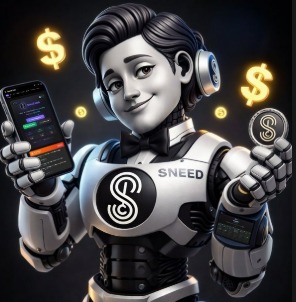Big announcements are often laced with loud promises, but the HanChain and ICP HUB Korea collaboration drops with a beat that’s a little harder to ignore. On paper, it’s a strategic partnership, but scratch beneath that surface and you’ll find a plan to rewire how music is streamed, tracked, and paid for across Web3—without handing the steering wheel to centralised platforms.
At the core of this alliance is HanChain, a Web3 music platform that’s been quietly collecting music IP like vinyl collectors at a flea market—$11 million worth, to be exact. They’ve now joined forces with the Korea wing of Internet Computer Protocol (ICP), a move that plants them firmly on the side of onchain accountability and opens up a new corridor for the decentralised music experience. For an industry known for its backstage wrangling over royalty splits, that’s no small shift.
What sets this partnership apart is not its glitzy promise to “change music,” but its emphasis on something music deals rarely offer with such confidence: proof. Every stream, every listen, every micro-interaction is set to be etched onto ICP’s blockchain through tamper-proof smart contracts—otherwise known as canisters. These aren’t just buzzwords thrown around to sound tech-forward. The idea is to give artists, labels, and even listeners a system where activity is trackable and verifiable by design. No middlemen tallying the numbers in a back office. No spreadsheets that miraculously ‘lose’ plays. Just clean, visible data locked in place.
What’s clever here is the way the tech fades into the background. Most listeners won’t notice—or care—that their play of a song is being recorded immutably on ICP. But what happens after that stream is where things start to sound different. Artists and rights holders can receive royalties that are settled transparently and efficiently, without waiting months for aggregated data or being short-changed due to ‘calculation errors’. This isn’t about reinvention for its own sake. It’s about nudging an existing system—often murky, often slow—into something faster and fairer, and doing it with infrastructure that doesn’t wobble under pressure.
HanChain isn’t arriving at this point without its own credentials. That $11 million in music IP assets isn’t theoretical. It’s a signal they’ve already convinced creators and rights holders to trust their platform, and it’s the sort of leverage that makes a blockchain-based transition feel less like a risky experiment and more like a necessary update. The ICP HUB Korea connection adds a layer of technical rigour, bringing in a network that’s designed for high-speed, low-cost smart contracts that can scale without needing to explain why gas fees are eating into the pie.
There’s a sense of symmetry here: HanChain brings the content muscle, ICP brings the architectural finesse. Together, they’re not just stacking tech—they’re laying a foundation where music and metadata can exist without fear of manipulation. For an industry that thrives on rights, licensing, and tiny slices of revenue spread across multiple parties, immutability matters. It’s one thing to stream a track a million times. It’s quite another to prove you’ve streamed it a million times—and have everyone agree on that number.
Behind the formal press-release lines lies a push towards a bigger idea: that Web3 doesn’t need to sit in a separate box marked ‘experimental’. With this partnership, decentralised technology becomes part of the standard workflow. It isn’t treated as a future possibility or a niche tool—it’s baked in. This has ripple effects for artists trying to move away from platform dependency. If they can host, stream, and monetise music in an ecosystem where terms aren’t buried in fine print and revenues don’t vanish into a black hole, the decision to go Web3 becomes less of a leap and more of a step.
Of course, the vision doesn’t land if the experience doesn’t match up. The infrastructure needs to be fast enough that listeners don’t feel they’re interacting with a slow-loading experiment. It needs to be sleek enough that artists don’t need to take a blockchain course just to upload a track. There’s no hint yet of the exact interface or tools the partnership will roll out, but the emphasis on “verifiable streaming” and “decentralised monetisation” points to a roadmap that includes user-friendly dashboards, smart contract automation, and real-time royalty metrics.
What’s interesting about HanChain’s positioning is how it avoids the usual trap of claiming to rescue artists from an evil industry. This isn’t a campaign built on disruption for its own sake. It’s focused on redesigning the pipework behind music streaming—less about blowing up the house and more about fixing the plumbing. And that’s where ICP HUB Korea comes in with the technical guarantee. The canister smart contracts they’re known for provide the perfect medium for scalable music infrastructure that can log, store, and verify data without crumbling under the weight of global usage.
It’s also a quiet flex for ICP as a network. For all the talk of Ethereum and Solana when it comes to Web3 music, this deal shows ICP’s ability to offer a real-time, reliable, tamper-proof backend that doesn’t buckle when the beat drops. If you want every single interaction with a piece of music to be recorded immutably, and done so without costing users or creators a fortune, that’s the kind of infrastructure you need.
This partnership may be Korea-specific on paper, but the implications go wider. Korea’s music industry—K-pop, global streaming figures, fan engagement at industrial scale—has long been a testbed for how music trends can go global overnight. If a Web3-native, onchain music streaming model gains traction here, it doesn’t stay local for long. The likelihood that these systems will be replicated, translated, and localised elsewhere is high, especially if artists start reporting faster settlements and fewer disputes.
There’s also an opportunity for new players—independent musicians, small labels, remix artists—to get in early on a system that treats them like data partners rather than inputs in a payout formula. That alone shifts the dynamics. Instead of waiting to be ‘discovered’ or fighting for shelf space on a bloated platform, musicians could be operating in a system where play data is public, rights ownership is verified on-chain, and audiences can interact directly with their work—potentially even through token-based models or direct micro-payments.
If the music industry’s last decade was shaped by streaming, the next one might well be shaped by verifiability. What matters now is not just how music reaches ears, but how the details of that journey are tracked, trusted, and turned into value. This partnership might not make headlines outside tech and crypto circles yet, but it’s quietly writing new sheet music for the background machinery that drives the industry.
HanChain and ICP HUB Korea haven’t promised revolution. What they’ve outlined instead is something that might actually stick—a clean, functional system where artists can upload, fans can stream, and every action leaves a digital footprint that’s trustworthy by default. And that’s probably the most promising beat of all.




